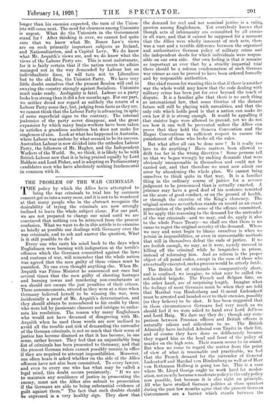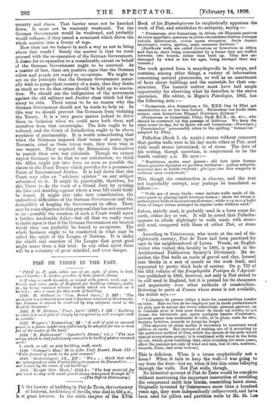THE PROBLEM OF THE WAR CRIMINALS. T HE policy by which
the Allies have attempted to bring the war criminals to trial has by common consent got us into a sorry mess, and it is not to be wondered at that many people who in the abstract recognize the desirability of trying the criminals are now strongly inclined to leave the whole subject alone. For our part, we are not prepared to change our mind until we are convinced that nothing can be retrieved from the present confusion. What we want to do in this article is to examine as briefly as possible our dealings with Germany over the war criminals, and to ask and answer the question, What is it still possible to do ?
Every one who casts his mind back to the days when Englishmen were burning with indignation at the terrible offences which the Germans committed against the laws and customs of war, will remember that the whole nation was agreed that the men guilty of these crimes must be punished. Ng one even thought anything else. When Mr. Asquith was Prime Minister he announced not once but several times that the men guilty of shooting hostages and burning towns and murdering non-combatants at sea should not escape the just penalties of their crimes. These announcements, uttered as they were at a time when Germany believed herself to be winning the war, were incidentally a proof of Mr. Asquith's determination, and they should always be remembered to his credit by those who were led by passionate clamour and intrigue to under- rate his resolution. The reason why many Englishmen who would not have dreamed of disagreeing with Mr. Asquith when he used those words are now inclined to avoid all the trouble and risk of demanding the surrender of the German criminals, is not so much that their sense of justice has become dimmed as that it has become, in one sense, rather keener. They feel that an unjustifiably long list of criminals has been presented to Germany, and that the present German rulers cannot possibly remain in office if they are required to attempt impossibilities. Moreover, one often hears it asked whether on the side of the Allies offences have not also been committed. To every lawyer, and even to every one who has what may be called a legal mind, this doubt occurs persistently. " If we are to maintain any semblance of justice in prosecuting the enemy, must not the Allies also submit to prosecution if the Germans are able to bring substantial evidence of guilt against them." The fact that such doubts should be expressed is a very healthy sign. They show that the demand for real and not nominal justice is a ruling passion among Englishmen. Yet everybody knows that though acts of inhumanity are committed by all armies in all wars, and that it cannot be supposed for a moment that the Allies were wholly innocent of such acts, there was a vast and a terrible difference between the organized and authoritative German policy of military crime and the independent deeds for which individuals were respon- sible on our own side. Our own feeling is that it remains as important as ever that by a strictly impartial trial there should be a solemn condemnation of such German war crimes as can be proved to have been ordered formally and by responsible authorities.
Our chief reason for wanting this is that if there is another war the whole world may know that the code dealing with military crime has been put for ever beyond the reach of dispute. It is a familiar gibe that there is no such thing as international law, that some Grotius of the distant future will still be playing with unrealities, and that the only rule which holds good is that a nation can make its own law if it is strong enough. It would be appalling if that sinister logic were allowed to prevail, yet we do not see how it can well be prevented unless the Allies can prove that they hold the Geneva Convention and the Hague Conventions in sufficient respect to ensure the punishment of those who broke all the rules.
But what after all can be done now ? Is it really too late to do anything ? Have matters been allowed to drift too far in the wrong direction ? Some persons tell us that we began wrongly by making demands that were obviously unreasonable in themselves and could not be carried out, and that therefore we must now admit our error by abandoning the whole plan. We cannot bring ourselves to think quite in that way. It is a familiar thing in the ordinary course of justice for a severer judgment to be pronounced than is actually exacted. A prisoner may have a good deal of his sentence remitted on the score of good conduct, or on the ground of health, or through the exercise of the King's clemency. The original sentence nevertheless stands on record as an exact appreciation of the public sense of the offence committed. If we apply this reasoning to the demand for the surrender of the war criminals—and we may, and do, apply it also to the whole Peace Treaty—we shall see that there is no cause to regret the original severity of the demand. Where we may and must begin to blame ourselves is when we persist in impossibilities, or even in unreasonable methods that will in themselves defeat the ends of justice. If we are foolish enough, we may, as it were, merely succeed in killing off the criminal while he languishes in prison, instead of reforming him. And as reform is the proper object of all penal codes, except in the case of those who are actually executed, such a process would be utterly futile.
The British list of criminals is comparatively short, and is confined, we imagine, to what may be called the red-handed brigade. The French and Belgian lists, on the other hand, are of surprising length. Imagine what the feelings of most Germans must be when they are told that Marshal von Hindenburg and General Ludendorff must be arrested and handed over to their enemies, possibly (as they believe) to be shot. It has been suggested that in these circumstances Germans feel very much as we should feel if we were asked to hand over Lord Jel'icoe and Lord Haig. We dare say they do ; though any com- parison between Prussian officers and British officers is naturally odious and ridiculous to us. The British Admiralty have included Admiral von Tirpitz in their list, and of course they have done so deliberately because they regard him as the head and front of the policy of murder on the high seas. Their reason seems to us sound. But when we come to regard the matter from the point of view of what is reasonable and practicable, we feel that the French demand for the surrender of General Ludendorff and Marshal von Hindenburg as well as of Herr von Bethmann Hollweg is going too far. This is a case where Mr. Lloyd George ought to work hard for moder- ation, not merely because a moderate policy is the only policy now possible, but because it is also right on principle. All who have studied German politics at close quarters during the past few months agree that the present German Government are a barrier which stands between the country and chaos. That barrier must not be knocked down. It must not be wantonly weakened. Yet the German Government would be weakened, and probably would collapse, if they issued a command which drove the whole country into a frenzy of rage. How then can we behave in such a way as not to bring about that result ? Surely the answer is that we must proceed with the co-operation of the German Government. A desire for co-operation to a considerable extent on behalf of the German Government ought to be assumed. As a matter of fact, there are positive signs that the German rulers and people are ready to co-operate. We ought to act on the principle that the German Government natur- ally wish to purge their country of a stain, that they desire as much as we do that crime should be held. up to execra- tion. We should use the indignation of the newcomers against the old military and Junker class which led Ger- many to ruin. There seems to be no reason why the German Government should not be made to help us. In this way we should prevent the Germans from violating the Treaty. It is a very grave matter indeed to drive them to violation when we could save both them and ourselves from that catastrophe. The lists ought to be reduced, and the Court of Jurisdiction ought to be above suspicion of partisanship. It is worth remembering that when the Germans imposed their terms of peace upon Rumania, cruel as those terms were, they were wise in one respect. They required the Rumanians themselves to punish their own war criminals. Though we cannot expect Germany to do that to our satisfaction, we think the Allies might put into force as soon as possible the clause in the Peace Treaty which provides for a permanent Court of International Justice. It is laid down that this Court may offer an " advisory opinion " on any subject submitted to it. It might be practicable, therefore, for this Court to do the work of a Grand Jury by revising the lists and deciding against whom a true bill could fairly be found. It might also take into consideration the undoubted difficulties of the German Government and the desirability of keeping the Government in office. There may be some objection to this proposal that has not occurred to us—possibly the creation of such a Court would mean a further intolerable delay—but all that we really want to insist upon is that if the German Government are treated wisely they can probably be forced to co-operate. The whole business ought to be conducted in what may be called the spirit of the League of Nations. It is under the shield and sanction of the League that great good might come from a fair trial. In any other spirit there will be a certainty of great mischief, and even danger.



































 Previous page
Previous page